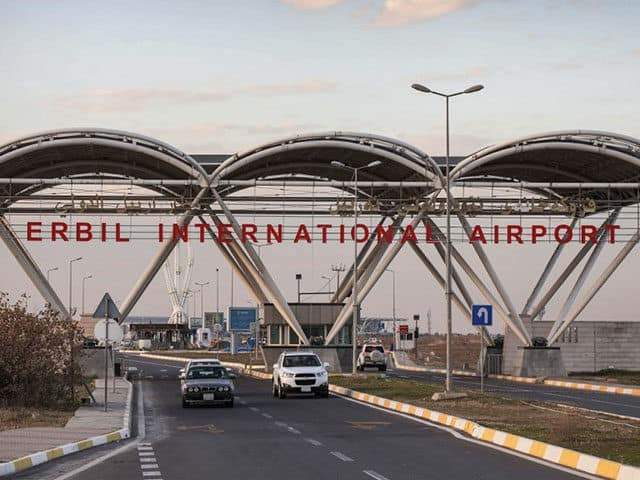Militia Suspected of Iran Ties Takes Credit for Iraqi Kurdistan Bombing, Injury of U.S. Soldier

An Iran-backed militant group in Iraq called Saraya Awlia al-Dam, or “Guardians of Blood Brigades,” quickly took credit for Monday’s rocket attack on the Erbil International Airport in the Kurdistan region.
The attack killed a civilian contractor and injured five other people, including a U.S. service member.
Kurdish news service Rudaw reported a “swarm of rockets” were fired at the Kurdistan region’s capital city of Erbil on Monday night, hitting targets that included “the Chinese consulate, a livestock market, and residential areas.” Injuries and at least one fatality were reported from a rocket that struck an apartment building.
Two of the rockets hit the Erbil International Airport, while a third flew overhead. The airport explosions injured five Americans, one of them a service member, and killed a civilian contractor who was not an American citizen.
Kurdish counterterrorism officials said the 14 rockets were launched from a vehicle, which they have recovered. The launch site was situated “on the road between Erbil city and Gwer,” to the west of the capital. The Kurdish Interior Ministry said the same tactics were employed to launch rockets at Erbil in September 2020.
“We were able to perform a strong attack with 24 rockets that hit its targets precisely after the failure of the CRAM defense system and the coalition missiles from stopping it,” Saraya Awlia al-Dam said in a statement published on propaganda channels used by the Popular Mobilization Forces (PMF), the umbrella term for the Shiite militia groups deputized to fight the Islamic State by the Iraqi government. The PMF maintain close ties to the Iranian government.
Although it claimed to have “hit its targets precisely,” the militia group also said it was shooting at the al-Harir military base, an installation used by American troops to coordinate operations in Syria, which is located some 60 kilometers northeast of Erbil.
Al-Harir has been attacked by Iran’s militia proxies in Iraq on previous occasions, and by Iran itself in January 2020 after Iranian terrorist commander Gen. Qasem Soleimani was eliminated by a U.S. airstrike at the Baghdad airport.
Saraya Awlia al-Dam is a relatively obscure Shiite militia group, one of the small but vicious “Katyusha cells” loyal to Iran that formed in Iraq after Soleimani’s death. The name refers to the Russian-made Katyusha rockets these groups favor to launch their indiscriminate attacks, which are essentially drive-by shootings with rockets.
Although they are controlled by Iran and its Islamic Revolutionary Guard Corps (IRGC), these militants usually collect salaries from Iraq and its PMF program. The Katyusha cells launched dozens of attacks against American positions in Iraq throughout 2020, but scaled their operations back during the U.S. presidential election, presumably to give Iran some space to negotiate with incoming President Joe Biden. Monday’s attack on Erbil could be a warning to the Biden administration or a sign of renewed hostilities at Iran’s direction.
The Iranian Foreign Ministry on Tuesday “condemned” allegations that Iran was linked to the Erbil attack, insisting the regime in Tehran “considers the stability and security of Iraq central to the region and its neighbors, and rejects any attempt that disturbs the peace and order of the country.” Iran denied accusations by Iraqi officials that it controls the group responsible for the Erbil attack.
The Kurdistan Regional Government on Tuesday announced a joint investigation of the attack with the Iraqi central government, as directed by Iraqi Prime Minister Mustafa al-Kadhimi.
“The Iraqi government will use all means to fight the remnants of terrorism in any form and under any name, and it is determined to continue its war against these terrorist groups,” the Iraqi Foreign Ministry declared.
Photo: SAFIN HAMED/AFP via Getty Images
Link: Militia Suspected of Iran Ties Takes Credit for Iraqi Kurdistan Bombing (breitbart.com)




